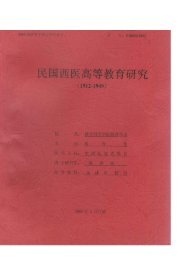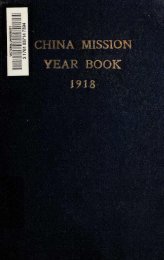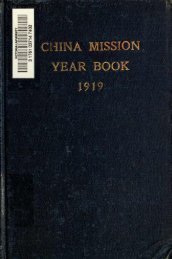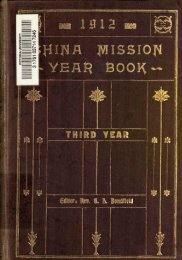- Page 2 and 3:
A ReliableReference Atlasis a neces
- Page 4 and 5:
\ STUDIA IN /THE LIBRARYofVICTORIA
- Page 6 and 7:
34-10,&
- Page 8 and 9:
llCHINA MISSION YEAR BOOK.ery, unde
- Page 11 and 12:
CONTENTS.PREFACE.CHAPTER I. GENERAL
- Page 13 and 14:
CONTENTS,viiCHAPTER XVI. REVIVALS.
- Page 15 and 16:
CHAPTERLGENERAL SURVEY (1907-WO).N
- Page 17 and 18:
""""GENERAL SUR
- Page 19 and 20:
GENERAL SURVEY. 5at an early day is
- Page 21 and 22:
"""GENERAL SURVEY, 7
- Page 23 and 24:
""""GENERA^ SUR
- Page 25 and 26:
""GENERAL SURVEV.IItorren
- Page 27 and 28:
GENERAL SURVEY, 13The general intro
- Page 29 and 30:
GENERAL SURVEY. 15number thus far a
- Page 31 and 32:
GENERAL, SURVEY. 17friendly officia
- Page 33 and 34:
"""yamnGENERAL SURVE
- Page 35 and 36:
GENERAL SURVEY. 21far as appears, m
- Page 37 and 38:
CHAPTER II.IMPORTANT EDICTS AND GOV
- Page 39 and 40:
"IMPORTANT EDICTS AND GOVERNME
- Page 41 and 42:
"IMPORTANT EDICTS AND GOVERNME
- Page 43 and 44:
"IMPORTANT EDICTS AND GOVERNME
- Page 45 and 46:
IMPORTANT EDICTS AND GOVERNMENT CHA
- Page 47 and 48:
"We"IMPORTANT EDICTS AND
- Page 49 and 50:
"IMPORTANT EDICTS AND GOVERNME
- Page 51 and 52:
IMPORTANT EDICTS AND GOVERNMENT CHA
- Page 53 and 54:
GOVERNMENT SCHOOLS. 39system which
- Page 55 and 56:
GOVERNMENT SCHOOLS. .41a natiun whi
- Page 57 and 58:
GOVKRNMKNT SCHOOLS. 43higher school
- Page 59 and 60:
(iOVKRNMENT SCHOOLS. 45their time i
- Page 61 and 62:
GOVKKNMKNT SCHOOLS. 47lines. Gratui
- Page 63 and 64:
GOVERNMENT SCHOOLS. 49found among t
- Page 65 and 66:
GOVERNMENT SCHOOLS. 51expenditure.
- Page 67 and 68:
GOVERNMENT SCHOOLS 53according to a
- Page 69 and 70:
GOVERNMENT SCHOOLS. 55to China with
- Page 71 and 72:
GOVERNMENT SCHOOLS, 57university wh
- Page 73 and 74:
GOVERNMENT SCHOOLS. 59regime. It so
- Page 75 and 76:
CHAPTERWORK FOR THE HIGHER CLASSES,
- Page 77 and 78:
WORK FOR THE HIGHER CLASSES. 63ton
- Page 79 and 80:
WORK FOR THE HIGHER CLASSES. 65majo
- Page 81 and 82:
WORK FOR THE HIGHER CLASSES. 67ness
- Page 83 and 84:
WORK FOR THE HIGHER CLASSES. 69The
- Page 85 and 86:
"""WORK FOR THE HIGH
- Page 87 and 88:
CHAPTER V.MISSION SCHOOLS, COLLEGES
- Page 89 and 90:
MISSION SCHOOLS FOR MKN AND BOYS. 7
- Page 91 and 92:
MISSION SCHOOLS FOR MKN AND BOYS. 7
- Page 93 and 94:
"MISSION SCHOOLS FOR MKN AND B
- Page 95 and 96:
"MISSION .SCHOOLS FOR MEN AND
- Page 97 and 98:
MISSION SCHOOLS FOR MEN AND BOYS.IR
- Page 99 and 100:
MISSION SCHOOLS FOR MEN AND BOYS. 8
- Page 101 and 102:
MISSION SCHOOLS FOR MEN AND BOYS. 8
- Page 103 and 104:
MISSION SCHOOLS FOR MEN AND BOYS. 8
- Page 105 and 106:
MISSION "SCHOOLS FOR MEN AND B
- Page 107 and 108:
MISSION SCHOOLS FOR MEN AND BOYS. 9
- Page 109 and 110:
MISSION SCHOOLS FOR MEN AND BOYS. 9
- Page 111 and 112:
MISSION SCHOOLS FOR MEN AND BOYS. 9
- Page 113 and 114:
MISSION SCHOOLS FOR MKN AND BOYS. 9
- Page 115 and 116:
MISSION SCHOOLS FOR MEN AND BOYS.IO
- Page 117 and 118:
MISSION SCHOOLS FOR MEN AND BOYS. 1
- Page 119 and 120:
""MISSION SCHOOLS FOR MEN
- Page 121 and 122:
MISSION SCHOOLS KOR MKN AND BOYS.IC
- Page 123 and 124:
MISSION SCHOOLS FOR MEN AND HOYS. 1
- Page 125 and 126:
MISSION SCHOOLS FOR MEN AND BOYS.Il
- Page 127 and 128:
CHAPTERVLEVANGELISTIC WORK.(Extract
- Page 129 and 130:
EVANGELISTIC WORK. 115when the men
- Page 131 and 132:
EVANGELISTIC WORK. 117of the relief
- Page 133 and 134:
EVANGELISTIC WORK. 119Another year
- Page 135 and 136:
EVANGELISTIC WORK. 121of the reviva
- Page 137 and 138:
EVANGELISTIC WORK. 123Mission only
- Page 139 and 140:
EVANGELISTIC WORK. 125a rope around
- Page 141 and 142:
EVANGELISTIC WORK. 127had not a gre
- Page 143 and 144:
EVANGELISTIC WOKK. 129has been the
- Page 145 and 146:
"AsEVANGELISTIC WORK. 131Durin
- Page 147 and 148:
F.VANGKLISTIC WORK. 133The first th
- Page 149 and 150:
EVANGELISTIC WORK. 135Nganwhei, and
- Page 151 and 152:
KVANGEUSTIC WORK. 137There, at our
- Page 153 and 154:
EVANGELISTIC WORK. 139their workers
- Page 155 and 156:
EVANGELISTIC WORK. 14!Shensi will,
- Page 157 and 158:
EVANGELISTIC WORK. 143Converted in
- Page 159 and 160:
EVANGELISTIC WORK. 145government pr
- Page 161 and 162:
EVANGELISTIC WORK. 147study has bee
- Page 163 and 164:
""EVANGELISTIC WORK. 149N
- Page 165 and 166:
""KVANGEUvSTIC WORK. 151m
- Page 167 and 168:
" "Come"EVANGELISTIC
- Page 169 and 170:
EVANGELISTIC WORK. 155wit, that the
- Page 171 and 172:
EVANGELISTIC WORK. 157evident. We a
- Page 173 and 174:
"The"EVANGELISTIC WORK. 1
- Page 175 and 176:
EVANGELISTIC WORK.l6lbecause of irr
- Page 177 and 178:
EVANGELISTIC WORK. 163Singapore.The
- Page 179 and 180:
KVANGKTJSTIC WORK. 165the close of
- Page 181 and 182:
"EVANGELISTIC WORK. 167of the
- Page 183 and 184:
"""EVANGELISTIC WORK
- Page 185 and 186:
EVANGELISTIC WORK. 171clergyman to
- Page 187 and 188:
EVANGELISTIC WORK. 173hearts are sa
- Page 189 and 190:
EVANGELISATION IN THE CITIES. 17511
- Page 191 and 192:
EVANGELISATION IN THE CITIES. 177wh
- Page 193 and 194:
EVANGELISATION IN THE CITIES. 179is
- Page 195 and 196:
EVANGELISTIC WORK IN THE COUNTRY. l
- Page 197 and 198:
EVANGELISTIC WORK IN THE COUNTRY. 1
- Page 199 and 200:
EVANGELISTIC WORK IN THE COUNTRY. 1
- Page 201 and 202:
EVANGEUSTIC WORK IN THE COUNTRY. 18
- Page 203 and 204:
CHAPTERVIII*INDEPENDENCE AND SELF-S
- Page 205 and 206:
INDEPENDENCE AND SELF-SUPPORT.IQIha
- Page 207 and 208:
INDEPENDENCE AND SELF-SUPPORT. 193m
- Page 209 and 210:
INDEPENDENCE AND SELF-SUPPORT. 195o
- Page 211 and 212:
INDEPENDENCE AND SELF-SUPPORT. 197c
- Page 213 and 214:
"""INDEPENDENCE AND
- Page 215 and 216:
INDEPENDENCE AND SELF-SUPPORT.2OI(g
- Page 217 and 218:
INDEPENDENCE AND SELF-SUPPORT. 2039
- Page 219 and 220:
INDEPENDENCE AND SELF-SUPPORT. 205(
- Page 221 and 222:
INDEPENDENCE AND SELF-SUPPORT. 207C
- Page 223 and 224:
INDEPENDENCE AND SEl^F-SUPPORT.2OQT
- Page 225 and 226:
MEDICAL MISSIONARY WORK. 211sad to
- Page 227 and 228:
MEDICAL MISSIONARY WORK.METHODS.The
- Page 229 and 230:
MKDICAI, MISSIONARY WORK. 215PROSPE
- Page 231 and 232:
MEDICAL EDUCATION. 2 17Syllab2is.Th
- Page 233 and 234:
MEDICAL EDUCATION 2 .19distinctivel
- Page 235 and 236:
MEDICAL EDUCATION. 221A MEDICAL COL
- Page 237 and 238:
MEDICAL EDUCATION. 223three foreign
- Page 239 and 240:
MEDICAL EDUCATION. 225or possibly H
- Page 241 and 242:
MEDICAL EDUCATION. 227Missionary So
- Page 243 and 244:
MEDICAL EDUCATION. 229At present ou
- Page 245 and 246:
MEDICAI, EDUCATION. 231few official
- Page 247 and 248:
MEDICAL EDUCATION. 233felt, moreove
- Page 249 and 250:
CHAPTER XLTHEOLOGICAL EDUCATION.The
- Page 251 and 252:
THEOLOGICAL EDUCATION .237is thirty
- Page 253 and 254:
THEOLOGICAL EDUCATION. 239place wit
- Page 255 and 256:
THEOLOGICAL EDUCATION. 24!schools a
- Page 257 and 258:
THEOLOGICAL EDUCATION. 243doubtless
- Page 259 and 260:
Catechetical c
- Page 261 and 262:
THEOLOGICAL EDUCATION. 247Theologic
- Page 263 and 264:
THKOLOGICAI, EDUCATION. 249ed that
- Page 265 and 266:
THEOLOGICAL EDUCATION. 251Fukien ar
- Page 267 and 268:
THEOLOGICAL EDUCATION. 253as well a
- Page 269 and 270:
THE BIBLE STUDY MOVEMENT. 255F. J.
- Page 271 and 272:
THE BIBLE STUDY MOVEMENT. 257GATHER
- Page 273 and 274:
"THK BIBLE STUDY MOVEMENT. 259
- Page 275 and 276:
CHAPTERXIIISUNDAY SCHOOL AND CHRIST
- Page 277 and 278:
SUNDAY SCHOOL AND CHRISTIAN KNDKAVO
- Page 279 and 280:
"SUNDAY SCHOOL AND CHRISTIAN E
- Page 281 and 282:
SUNDAY SCHOOL AND CHRISTIAN ENDKAVO
- Page 283 and 284:
"TheWOMAN S WORK IN GENERAL. 2
- Page 285 and 286:
"""WOMAN S WORK IN G
- Page 287 and 288:
WOMAN S WORK IN GENERAL. 273UP-BUIL
- Page 289 and 290:
""WOMAN S WORK IN GHNKRAL
- Page 291 and 292:
"WOMAN S WORK IN GENERAL. 27-I
- Page 293 and 294:
WOMAN S WORK IN GKNKRAL. 279and ref
- Page 295 and 296:
""""WOMAN S WOR
- Page 297 and 298:
"WOMAN S WORK IN GENERAL. 283I
- Page 299 and 300:
WOMAN S WORK IN GKNKRAI,. 285with t
- Page 301 and 302:
WOMAN S WORK IN GENERAL. 287under t
- Page 303 and 304:
WOMAN S WORK EDUCATIONAL. 289School
- Page 305 and 306:
WOMAN S WORK EDUCATIONAL. 291Memori
- Page 307 and 308:
WOMAN S WORK EDUCATIONAL. 293to the
- Page 309 and 310:
ThereWOMAN S WORK EDUCATIONAL. 295t
- Page 311 and 312:
WOMAN S WORK EDUCATIONAL. 297Raisin
- Page 313 and 314:
WOMAN S WORK EDUCATIONAL. 299to sta
- Page 315 and 316:
WOMAN S WORK EDUCATIONAL. 301third
- Page 317 and 318:
WOMAN S WORK EDUCATIONAL. 303SHANSI
- Page 319 and 320:
WOMAN S WORK EDUCATION AI,. 305Sout
- Page 321 and 322:
WOMAN S WORK EDUCATIONAL. 307In the
- Page 323 and 324:
WOMAN S WORK EDUCATIONAL. 309obtain
- Page 325 and 326:
WOMAN S WORK EDUCATIONAL. 311freely
- Page 327 and 328:
l<CHAPTERXVI.REVIVALS.(TTHE
- Page 329 and 330:
"REVIVALS. 315Iielcl in a larg
- Page 331 and 332:
""REVIVALS. 317doned. The
- Page 333 and 334:
"REVIVALS. 319carries so easil
- Page 335 and 336:
FEDERATION AND UNION. 321Turning to
- Page 337 and 338:
FEDERATION AND UNION. 323church ord
- Page 339 and 340:
CHAPTERXVIILTHE CHRISTIAN LITERATUR
- Page 341 and 342:
"RexTIIK CHRISTIAN LITKRATURK
- Page 343 and 344:
THE CHRISTIAN LITERATURE SOCIETY. 3
- Page 345 and 346:
THE CHRISTIAN LITERATURE SOCIETY. 3
- Page 347 and 348:
THK CHRISTIAN LITERATURE SOCIETY. 3
- Page 349 and 350:
THE TRACT SOCIETIES IN CHINA. 335Th
- Page 351 and 352:
THE TRACT SOCIETIES IN CHINA. 337il
- Page 353 and 354:
THE TRACT SOCIETIES IN CHINA. 339al
- Page 355 and 356:
THE TRACT SOCIETIES IN CHINA. 341Ca
- Page 357 and 358:
CHAPTER XX.CHRISTIAN PERIODICALS.19
- Page 359 and 360:
""CHRISTIAN PERIODICALS.
- Page 361 and 362: CHRISTIAN PERIODICALS. 347Dr. Wm. M
- Page 363 and 364: CHRISTIAN PKKIODICALS. 349Dr. S. Is
- Page 365 and 366: CHAPTER XXLMISSION PRESSES.AMERICAN
- Page 367 and 368: MISSION PRESSES. 353NATIONAL BIBLE
- Page 369 and 370: MTSvSION PRESSES. 355General book a
- Page 371 and 372: MISSION PRESSES. 357and foreign sty
- Page 373 and 374: MISSION PRESSES. 359UNION UNIVERSIT
- Page 375 and 376: MISSION PRKSSKS. 361in which it is
- Page 377 and 378: CHAPTER XXII,THE BIBLE SOCIETIES.Br
- Page 379 and 380: "WeTHK BIBLE SOCIETIES. 365Chi
- Page 381 and 382: THK BIBI.K SOCIKTIKS. 367while the
- Page 383 and 384: THK BIBUi vSOClKTlKS. 369other Chri
- Page 385 and 386: THE B1BLK SOCIETIES. 371Reproductio
- Page 387 and 388: "THE BIBLE SOCIETIES. 373deman
- Page 389 and 390: "THE BIBLR SOCIETIES. 375Total
- Page 391 and 392: ""THE BIBLE SOCIETIES. 37
- Page 393 and 394: BIBLE TRANSLATION AND REVISION. 379
- Page 395 and 396: SPKCIAI, PHILANTHROPY. 381B. The sy
- Page 397 and 398: SPECIAL PHILANTHROPY. 383would not
- Page 399 and 400: SPECIAL PHILANTHROPY. 385The "
- Page 401 and 402: SPECIAL PHILANTHROPY. 387NankingNan
- Page 403 and 404: SPECIAL PHILANTHROPY. 389sufferers.
- Page 405 and 406: SPECIAL PHILANTHROPY.3QIThe John G.
- Page 407 and 408: SPECIAL PHILANTHROPY. 393the number
- Page 409 and 410: INDUSTRIAL WORK. 395all parts of Ch
- Page 411: INDUSTRIAL WORK. 397ment. The fact
- Page 415 and 416: PROGRESS OF OPIUM REFORM. 4OItheref
- Page 417 and 418: CHAPTER XXVILYOUNG MEN SCHRISTIAN A
- Page 419 and 420: <4DoYOUNG MEN S CHRISTIAN AS
- Page 421 and 422: ""YOUNG MEN S CHRISTIAN A
- Page 423 and 424: YOUNG MEN S CHRISTIAN ASSOCIATION,
- Page 425 and 426: YOUNG MEN S CHRISTIAN ASSOCIATION.
- Page 427 and 428: YOUNG MEN S CHRISTIAN ASSOCIATION.
- Page 429 and 430: "AYOUNG MEN S CHRISTIAN ASSOCI
- Page 431 and 432: YOUNG MEN S CHRISTIAN ASSOCIATION.
- Page 433 and 434: CHAPTER XXVIILWORK FOR CHINESE ABRO
- Page 435 and 436: WORK FOR CHINESE ABROAD. 4216. Hawa
- Page 437 and 438: WORK FOR CHINESE ABROAD. 423O). Rev
- Page 439 and 440: CHAPTER XXIX.THE GREEK CHURCH.T the
- Page 441 and 442: CHAPTER XXX.ROMAN CATHOLIC MISSIONS
- Page 443 and 444: AccroisVicariatsCatehumdneseuienapo
- Page 445: ROMAN CATHOTJC MISSIONS IN CHINA. 4
- Page 448 and 449: 11 CHINA MISSION YEAR BOOK.1908.Mar
- Page 450 and 451: CHINA MISSION YKAR BOOK.1909.Oct. R
- Page 452 and 453: VICHINA MISSION YEAR BOOK.1910.Apr.
- Page 454 and 455: VlllCHINA MISSION YEAR BOOK.trouble
- Page 456 and 457: XCHINA MISSION YEAR BOOK.Ill 1898 R
- Page 458 and 459: XllCHINA MISSION YEAR BOOK.the offi
- Page 460 and 461: "XIVCHINA MISSION YEAR BOOK.Dr
- Page 462 and 463:
XVlCHINA MISSION YEAR BOOK.liminary
- Page 464 and 465:
CHINA MISSION YHAK BOOK.
- Page 466 and 467:
~~"a""^>?XX C
- Page 468 and 469:
>. g>3xxil CHINA MISS
- Page 470 and 471:
"Review""American&qu
- Page 472 and 473:
""""""
- Page 474 and 475:
""""""
- Page 476 and 477:
""""""
- Page 478 and 479:
4>XXX11 CHINA MISSION YEAR B
- Page 480 and 481:
APPENDIX VILNORTH-CHINA BRANCH OF T
- Page 482 and 483:
XXXVI CHINA MISSION YEAR BOOK.early
- Page 484:
>H.APPENDIX IX.LIST OF NEW S
- Page 487 and 488:
HALLEY S COMET IN CHINA. xliof a st
- Page 489:
HAU,EY S COMET IN CHINA. xliiioffic
- Page 492 and 493:
11 CHINA MISSION YEAR BOOK.Cumb. P.
- Page 494 and 495:
DIRECTORY,Abernethy, Miss G., S. B.
- Page 496 and 497:
vi CHINA MISSION YEAR BOOK.Andrew,
- Page 498 and 499:
VliiCHINA MISSION YEAR BOOK.Bearder
- Page 500 and 501:
XCHINA MISSION YEAR BOOK.Boaz, Miss
- Page 502 and 503:
XllCHINA MISSION YEAR BOOK.Browne,
- Page 504 and 505:
XIVCHINA MISSION YEAR BOOK.Carr, J.
- Page 506 and 507:
viaXVICHINA MISSION YKAR BOOK.Coope
- Page 508 and 509:
andhuhsien,B.,XV111CHINA MISSION YE
- Page 510 and 511:
XX CHINA MISSION YEAR BOOK.Dunlap,
- Page 512 and 513:
XXI 1 CHINA MISSION YKAR BOOK.Faers
- Page 514 and 515:
XXIV CHINA MISSION YEAR BOOK.Freden
- Page 516 and 517:
XXviCHINA MISSION YEAR BOOK.Glover,
- Page 518 and 519:
XXV111CHINA MISSION YEAR BOOK.Guex,
- Page 520 and 521:
XXX CHINA MISSION YEAR BOOK.Hayes,
- Page 522 and 523:
XXX11 CHINA MISSION YKAR BOOK.Holt,
- Page 524 and 525:
XXXIVCHINA MISSION YEAR BOOK.Jeffer
- Page 526 and 527:
XXXVI CHINA MISSION YEAR BOOK.Keele
- Page 528 and 529:
XXXVliiCHINA MISSION YEAR BOOK.Lamp
- Page 530 and 531:
xlCHINA MISSIOX YEAR BOOK.Lindberg,
- Page 532 and 533:
XlllCHINA MISSION YEAR BOOK.Machle,
- Page 534 and 535:
xlivCHINA MISSION YEAR BOOK.McBurne
- Page 536 and 537:
Xlvi CHINA MISSION YEAR BOOK.Metcal
- Page 538 and 539:
xlviiiCHINA MISSION YEAR BOOK.Mount
- Page 540 and 541:
1 CHINA MISSION YEAR BOOK.North, T.
- Page 542 and 543:
HiCHINA MISSION YEAR BOOK.Paterson,
- Page 544 and 545:
HvCHINA MISSION YEAR BOOK.Pott, F.
- Page 546 and 547:
Sw.IviCHINA MISSION YEAR BOOK.Ricke
- Page 548 and 549:
IviiiCHINA MISSION YEAR BOOK.Sanies
- Page 550 and 551:
IxCHINA MISSION YEAR BOOK.Shearer,
- Page 552 and 553:
IxiiCHINA MISSION YKAR BOOK.Snyder,
- Page 554 and 555:
CHINA MISSION YEAR BOOK.Strand, Mis
- Page 556 and 557:
IxviCHINA MISSION YEAR BOOK.Thompso
- Page 558 and 559:
B.,IxviiiCHINA MISSION YEAR BOOK.Va
- Page 560 and 561:
1XXCHINA MISSION YEAR BOOK.Watts, M
- Page 562 and 563:
IxxiiCHINA MISSION YEAR BOOK.Willia
- Page 564:
IxxivCHINA MISSION YKAR BOOK.Young,
- Page 567 and 568:
11 CHINA MISSION YEAR BOOK.Ashmore,
- Page 569 and 570:
"China""""
- Page 571 and 572:
VI CHINA MISSION YEAR BOOK.Domestic
- Page 573 and 574:
ViiiCHINA MISSION YEAR BOOK.Goodric
- Page 575 and 576:
XCHINA MISSION YKAR BOOK.John G. Ke
- Page 577 and 578:
Xll CHINA MISSION YKAR BOOK.Mission
- Page 579 and 580:
""8,XIV CHINA MISSION YEA
- Page 581 and 582:
"XVICHINA MISSION YEAR BOOK.Sh
- Page 583 and 584:
""I59>XViiiCHINA M
- Page 585:
XXCHINA MISSION YEAR BOOK.Yung Kuei
- Page 588:
BOOKS FOR THE THOUGHTFUL.Demy 8vo,










